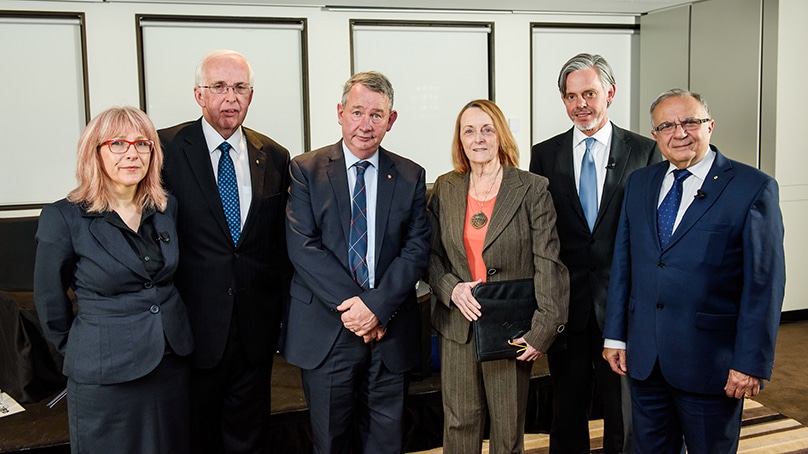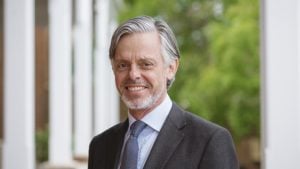
A key new Australian Catholic University institute named after an Irish barrister, writer, parliamentarian and co-founder of the Commonwealth of Australia hopes to give voice to the relevance and insights of religion in the public square of Australian civic policy and debate.
It’s founding comes at a time when religious faith appears to be increasingly under attack in Australia from resurgent forces of secularism in the media, academia and politics.
The Patrick McMahon Glynn (PMG) Institute, named for a key figure in early Australian history who was a lifelong devoted Catholic prominent in the public life of his day, was officially launched on Thursday 13 October and is located at ACUs North Sydney Campus.
Using its own research, as well as a wider network of scholarship, the PMG Institute is working to create a reliable sociological “map” of Australia that can be used to inform public policy and decision makers said its first director, Dr Michael Casey.
Dr Casey was previously private secretary to Cardinal George Pell for many years.
“I think we can navigate most landscapes if we have an accurate map,” Dr Casey, told The Catholic Weekly after the launch, “so gathering evidence, looking at things, clearly and soberly is foundational to our work.”
“We’re a public policy institute attached to the university; we are not an academic research institute. Our mission is to take the good research that’s being done here and other places and to try and see how it can apply to assist with some of these issues [facing Australian policy makers].”

The two researchers currently employed by the institute are Fr Frank Brennan SJ, professor of law at Australian Catholic University, a recipient of the 1995 Order of Australia for services to Aboriginal Australians, and Dr Damien Freeman, a visiting scholar who lectures on ethics and aesthetics at Pembroke College, Cambridge.
The institute has an advisory board, made up of eleven individuals from different areas across the Church and community, who give the institute “priority and direction”.
These are Julien O’Connell, Pro-Chancellor of ACU, and Chair of the PMG’s Advisory Board; Pam Betts, Executive Director of the Catholic Education Office in the Archdiocese of Brisbane; lawyers Virginia Bourke and Patrick Mullins; Bishop Peter Comensoli of Broken Bay; Jennifer Cook, General Counsel to the Catholic Archdiocese of Sydney; Jack de Groot, CEO of NSW’s St Vincent de Paul Society; Stepan Kerkyasharian, the former President and Chief Executive of the NSW Anti-Discrimination Commission (2003-16); Brian Loughnane, political and business strategic consultant; Dr Brigid McKenna, Director of the Office of Life, Marriage and Family in the Archdiocese of Hobart and Francis Sullivan, CEO of the Truth, Justice and Healing Council.
“It is a very representative body. They represent not just the different works and the different geographical locations of the Church, but also a good range of views on strategic challenges facing us,” said Michael.
The institute will focus on three ‘streams’. The first is ‘Democracy in a Religious World.’
“Last year the Pew Research Centre in Washington published some projections about numbers of believers and religious affiliations across the world over the next half century (The Future of World Religions: Population Growth Projections, 2010-2050, published 2 April 2015) found that … the world, as a whole, is becoming more religious, not less.
“Australia, and countries like ours, are going to become more secular … but we will be engaging in a world that is more religious. So it is very important to reflect on what this reality entails, to really understand clearly the role of religion in people’s lives,” he said.
Michael says there are many projects that flow from this insight. One of these is to record the local work carried out by religious communities, which is “often taken for granted”.
“Faith based communities and local parishes do a lot of work helping people who have been hurt and have a hard time recovering. I think it would be good to reflect on this, to tell some of the stories,” he said.
The second strand looks at the question of human rights.
“We’ve called this strand ‘The End of Human Rights?’ to try and highlight that there are some significant questions here. In the Catholic community, we are very conscious about religious freedom and freedom of conscience. But when you step back and look at the whole picture, this is just one subset of all the pressures and problems in the whole area of human rights.”
“We see it more broadly in the question of ‘tolerance’ and ‘intolerance’, freedom of speech, freedom of association, attempts to police speech and to shut people down in universities and in public debate, in how we can quickly describe what someone says as ‘hateful’ or ‘offensive’, simply because we disagree with it.”
Michael spoke about the “worrying trends in philosophy and ethics” that are moving away from the idea that human rights are “inviolable”.
“[There is a growing trend to see human rights as something] you might qualify for when you come of a certain age and certain capacity … This raises big problems.”
“The idea is to have a good sober look at this. Let’s look at the evidence coolly and calmly, follow the evidence wherever it leads.”
The third stream, ‘Strengthening Hope, Renewing Confidence’ is an attempt to document what is working well in society.
“I think there are a lot of challenges we face in the Church, and in Australia. But I think the fact that there are a lot of challenges often overshadows the fact that there are a lot of opportunities too,” said Michael.
“I’m really excited about drawing out those opportunities and making them a bit clearer, so that it will contribute to a more positive and respectful way of engaging with critical issues.”
Before the official launch, the institute hosted its first conference, ‘Protecting Rights, Protecting People’, held over two days in Sydney and Melbourne on the 5th and 8th of September, respectively.
This showcased the scope of the institute’s capacities, where the 65 attendants could hear from speakers ranging from Canada’s Fr Raymond de Souza on the martyrdom of Fr Jacques Hamel, to Archbishop Amel Nona, Archbishop of Mosul, before it fell to ISIS in 2014, to Prof Margaret Somerville, who spoke of the challenges facing healthcare in Australia.
Dr Michael is confident the institute will be a positive tool for change.
“If you take a strong evidence based approach to the work you are doing, if you are committed to listening carefully to deeper perspectives, I think that there is every likelihood people will be interested in what we have to say.”
